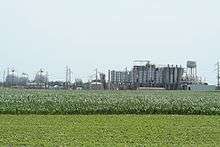Formosa Plastics Corp
| Traded as | TWSE: 1301 |
|---|---|
| Industry | Chemicals |
| Founded | 1954 |
| Headquarters | Kaohsiung City, Taiwan |
Key people |
Lee Chih-tsuen (李志村) (President) |
| Products | PVC (Polyvinyl Chloride) resins, high density polyethylene, tairylan acrylic fiber, acrylic acid and ester, carbon fiber, caustic soda, PVC modifier, calcium carbonate |
| Total assets |
|
Number of employees | 10,000 |
| Website |
www |

Formosa Plastics Corporation (Chinese: 台灣塑膠公司; literally: "Taiwan Plastic Company") (TWSE: 1301) is a Taiwanese plastics company based in Taiwan that primarily produces polyvinyl chloride (PVC) resins and other intermediate plastic products. It is the corporation around which influential businessman Wang Yung-ching formed the Formosa Plastics Group, and it remains central to the Group's petrochemical operations. The president of Formosa Plastics Corp. (FPC) is Lee Chih-tsuen (李志村).
Formosa Plastics Corporation was the world's fifth largest chemical company by sales in 2015. In 2016, the company was ranked No. 861 on the Forbes Global 2000 list of largest public companies in the world.
History
The company was founded in 1954, with a US$798,000 loan from United States aid agencies. The first PVC plant was constructed in Kaohsiung and production began in 1957. As of 2005, FPC is the largest producer of PVC resins in Taiwan. When FPC's American operations are also considered, the company's total PVC resin capacity is 2.83 million metric tons per year, the second highest in the world after Shin-Etsu Chemical, which has 3.55 million metric tons per year as of May 2010 (expanding to 3.85 million metric tons per year by the end of 2010).
FPC maintains numerous subsidiaries throughout Taiwan, jointly held with other members of the Formosa Plastics Group. In addition, Formosa Plastics Corporation, USA was founded in 1978 as a wholly owned subsidiary of FPC. That subsidiary has, in turn, created four wholly owned chemical manufacturing subsidiaries in Delaware City, Delaware, Illiopolis, Illinois, Baton Rouge, Louisiana, and Point Comfort, Texas.
Formosa Plastics Corporation's operations include chemical and petrochemical manufacturing. In 1994, Formosa formed the Formosa Transrail to operate rail fleet.
In 1999, Formosa Plastics used bribes to dump 3000 tons of mercury laden waste in Sihanoukville, Cambodia – three local villagers died shortly afterwards, although a report commissioned by the World Health Organisation concluded it was unlikely the deaths were due to mercury poisoning.[1] The company later tried to ship the waste to a hazardous waste site in Nevada, USA.[2]
Formosa Plastics have been involved in a series of deadly explosions at their facilities. After an explosion in a chemical plant owned by Formosa Plastics in Illiopolis, Illinois that killed 5 workers in April 2004,[3] OSHA fined the company $300,000 for violations. An explosion at a chemical plant owned by Formosa Plastics hurt 11 workers in South Texas in 2005.[4] A 2002 survey undertaken by Scorecard, an environmental watch group, rated their facilities in the 90% percentile of the worst environmental polluters.[5]
In April 2012, Formosa Plastic Group filed a US$1.3 million civil suit for a tort claim and a criminal suit for defamation against Ben-Jei Tsuang, National Chung Hsing University, Taichung, for presenting evidence of increased cancer risk in the vicinity of Formosa Plastic Group hydrocarbon-processing facility in Mailao, at a scientific meeting and in a paper. More than 1,000 academics, including chemistry Nobel laureate Lee Yuan-tseh, signed a letter of support for Tsuang. In September 2013, judges at Taipei District Court ruled against Formosa Plastic Group.[6]
In April 2016, Formosa was blamed by numerous protesters and media outlets for mass fish deaths in four provinces of Vietnam since April 6. On 30 June, 2016, the Vietnamese government officially concluded that the local Formosa affiliate steel plant was responsible for the marine ecological disaster. Formosa agreed to pay compensation of 500 Million US$ and publicly apologized for the disaster. [7] There are, however, rumors that the apology was issued under coercion from the Vietnamese government.[8]
See also
- List of companies of Taiwan
- Formosa Plastics Group Museum
- 2016 Vietnam fish kill
- Formosa Ha Tinh Steel
References
- ↑ Taiwan Used Bribes, Corruption to Dump Mercury Waste in Cambodia
- ↑ ReviewJournal"Nevada targeted for toxic sludge
- ↑ Ehstoday:After Five Fatalities, OSHA Fines Formosa Plastics $300,000
- ↑ 11 Hurt in Plastics Plant Explosion
- ↑ Scorecard
- ↑ Taiwan court clears academic in libel suit, Michele Catanzaro, Nature, 4 September 2013
- ↑ Diplomat, Shannon Tiezzi, The. "It's Official: Formosa Subsidiary Caused Mass Fish Deaths in Vietnam". Retrieved 2016-07-01.
- ↑ "Controversy shrouds Formosa Plastics' Vietnam fine". Nikkei Asian Review. 2016-07-05. Retrieved 2016-07-18.